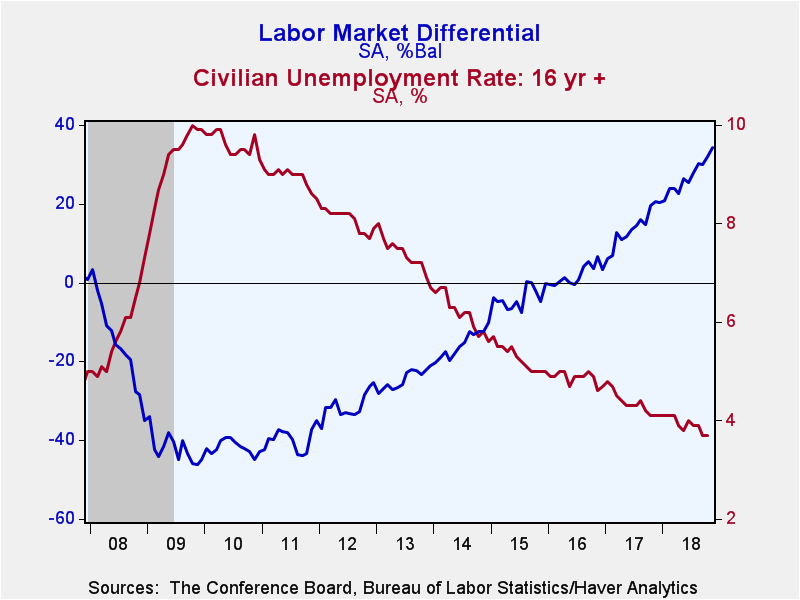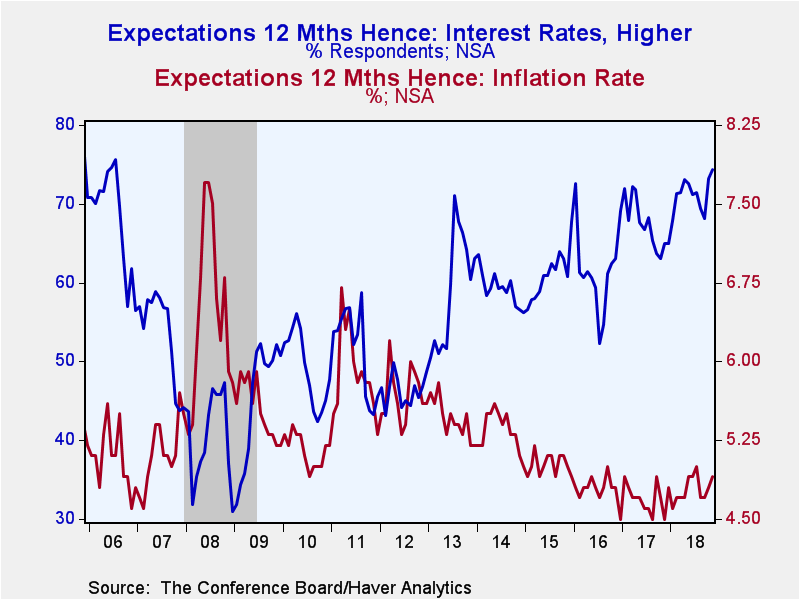 Global| Nov 27 2018
Global| Nov 27 2018U.S. Consumer Confidence Weakens
by:Tom Moeller
|in:Economy in Brief
Summary
The Conference Board Consumer Confidence Index declined 1.6% (+5.5% y/y) during November to 135.7 and reversed its unrevised 1.9% October increase. The November level compared to expectations for 136.0 in the Action Economics Forecast [...]
The Conference Board Consumer Confidence Index declined 1.6% (+5.5% y/y) during November to 135.7 and reversed its unrevised 1.9% October increase. The November level compared to expectations for 136.0 in the Action Economics Forecast Survey. The indexes in the report are based on 1985=100. During the past 10 years, there has been a 68% correlation between the level of consumer confidence and the y/y change in real PCE.
Weakness was led this month by a 3.6% decline in the expectations component, which was unchanged y/y at 111.0. It was the lowest level in three months. The present situations component improved 0.5% (11.5% y/y) to 172.7.
Business conditions were viewed as "good" by an increased 41.2% of respondents and viewed as "bad" by 10.9%. Jobs were viewed as "plentiful" by an increased 46.6% of respondents, the most since January 2001. Jobs were viewed as "hard to get" by 12.2% of respondents, roughly the fewest since November 2000. The net jobs assessment reading, the difference between plentiful and hard to get, increased to 34.4, a 17-year high. The differential has a 95% correlation with the unemployment rate.
Expectations for business conditions deteriorated m/m as a lessened 22.5% of respondents thought that conditions would improve. The figure is below the March 2017 high of 26.9%. Income was expected to increase in six months by a fewer 21.5% of respondents, down from 25.4% three months ago. Expectations that there would be more jobs in six months continued to improve to 22.8% of respondents, up from the recent low of 12.2% in February 2016. A fewer 11.1% of respondents thought that there would be lessened employment in six months.
The expected inflation rate in twelve months edged higher m/m to 4.9%, up from the 4.5% low twelve months ago. The percentage expecting higher interest rates over the next twelve months rose to 74.4%, the most since mid-2006. Those looking to buy a home in the next six months held steady m/m at 6.4%, and that was down from the 7.4% high late in 2017.
Confidence amongst respondents under age 35-years-old improved modestly but remained below the 18-year high reached in September. For those aged 35-54, confidence backed away from the18-year high reached last month. For those over 55 years of age, confidence strengthened to the highest level since February 2000.
The Consumer Confidence data is available in Haver's CBDB database. The total indexes appear in USECON, and the market expectations are in AS1REPNA.
Data Dependence and U.S. Monetary Policy is the title of today's speech by Fed Vice Chairman Richard H. Clarida and it can be found here
| Conference Board (SA, 1985=100) | Nov | Oct | Sep | Nov Y/Y | 2017 | 2016 | 2015 |
|---|---|---|---|---|---|---|---|
| Consumer Confidence Index | 135.7 | 137.9 | 135.3 | 5.5% | 120.5 | 99.8 | 98.0 |
| Present Situation | 172.7 | 171.9 | 169.4 | 11.5 | 144.8 | 120.3 | 111.7 |
| Expectations | 111.0 | 115.1 | 112.5 | 0.0 | 104.3 | 86.1 | 88.8 |
| Consumer Confidence By Age Group | |||||||
| Under 35 Years | 138.6 | 133.7 | 140.7 | 3.4 | 130.2 | 122.4 | 116.0 |
| Aged 35-54 Years | 132.0 | 143.2 | 135.5 | 4.1 | 123.5 | 106.2 | 103.9 |
| Over 55 Years | 137.0 | 134.9 | 131.2 | 7.0 | 112.9 | 84.6 | 84.1 |
Tom Moeller
AuthorMore in Author Profile »Prior to joining Haver Analytics in 2000, Mr. Moeller worked as the Economist at Chancellor Capital Management from 1985 to 1999. There, he developed comprehensive economic forecasts and interpreted economic data for equity and fixed income portfolio managers. Also at Chancellor, Mr. Moeller worked as an equity analyst and was responsible for researching and rating companies in the economically sensitive automobile and housing industries for investment in Chancellor’s equity portfolio. Prior to joining Chancellor, Mr. Moeller was an Economist at Citibank from 1979 to 1984. He also analyzed pricing behavior in the metals industry for the Council on Wage and Price Stability in Washington, D.C. In 1999, Mr. Moeller received the award for most accurate forecast from the Forecasters' Club of New York. From 1990 to 1992 he was President of the New York Association for Business Economists. Mr. Moeller earned an M.B.A. in Finance from Fordham University, where he graduated in 1987. He holds a Bachelor of Arts in Economics from George Washington University.
More Economy in Brief
 Global| Feb 05 2026
Global| Feb 05 2026Charts of the Week: Balanced Policy, Resilient Data and AI Narratives
by:Andrew Cates










